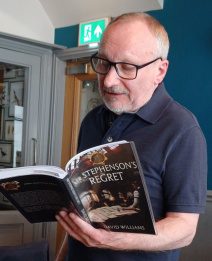Do the Locomotion! Novelist and poets mark Stockton & Darlington bicentenary

Poetry was the support act in Hexham on Saturday when novelist David Wiliams re-launched a novel he first published in 2012, to mark this year’s bicentenary of the Stockton & Darlington, the world’s first public railway.
It is this correspondent’s contention that we haven’t heard enough about the S&D so far this year, and that was partly why I went along to this event at the County hotel in Hexham, to learn about David’s novel, Mr Stephenson’s Regret – and also to take part in a railway-themed accompanying poetry open mic. (I have one or two railway poems of my own).
Mr Stephenson’s Regret is partly about the “enormously complex” relationship between George Stephenson and his equally famous son Robert, two men who played key roles in developing the railways, from the Stockton & Darlington onwards. David Williams – “I’m not a railway person, I’m interested in people” – said he was inspired to write the book by visiting George Stephenson’s birthplace in Wylam. He was astonished to discover that the Stephensons shared the cottage with three other families, and lived in a single room - mother, father, and six children: “From that room grew up the boy who literally changed the world.”
In his foreword to the reissued edition of his novel, to coincide with the bicentenary of the Stockton & Darlington, David Williams says such anniversaries “provide a rare opportunity to showcase a major landmark in history for people who might otherwise be unaware of it”.

He has also developed a play called Geordie on the same subject, which will be performed in Stockton later this year, and concluded Saturday’s event with a run-through of one of the scenes. David was interviewed about his book by his son, Joe, who also happens to be host of Hexham’s Words on the Wall, a popular open-mic event taking a break at the moment. To get us in the mood, Joe read WH Auden’s famous railway poem ‘Night Mail’, enlisting the audience to ‘chuff, chuff’ along in the background.
The open-mic highlight was a sound-poem recording called ‘Fuming’, delivered by facilitator Hilary Elder, who with sound designer Jeremy Bradfield and children from year 8 at Bedlington Academy in south-east Northumberland, had produced an evocative and haunting work about a local ironworks that produced the first wrought-iron rail strong enough to take the weight of steam locomotives. It was invented by John Burkenshaw, was taken up by the Stephensons, and thus played a key part in triggering the railway age.
Martyn Halsall read a poem from his recent, excellent collection Lent, about a train trip from the former Czechoslovakia in 1967, when a young woman asked to hide under their seats as they crossed the border. Penny Grennan, deputy mayor of Hexham, sang about ‘Puffing Billy, Wylam Dilly’, two steam locomotives that served the local Wylam colliery, and predated the famous Rocket. Both locos are on display in museums. There were also contributions from Julie Brown, Alice Skye, Richard Jackson, Carole Thirlaway, and myself.
Back to the Stephensons. Both refused knighthoods. “They didn’t toady to the aristocracy”, said David Williams, a long-standing author who has had plays produced by BBC Radio 4 and BBC Schools, as well as writing short stories and novels. Excuse me now, as I return to the story of George and Robert Stephenson, and try to work out the riddle of Mr Stephenson’s Regret …
David Williams, Mr Stephenson’s Regret, Wild Wolf Publishing





Emily Hunder
Tue 10th Jun 2025 08:29
This is a great way to celebrate the Stockton & Darlington's bicentenary! A novel and poetry event sounds engaging. It's interesting how a visit to George Stephenson's birthplace sparked the novel. Made me think about simple beginnings, just like how Papa's Pizzeria likely started. I wonder if the play will involve any culinary train stops? https://papaspizzeriagame.com